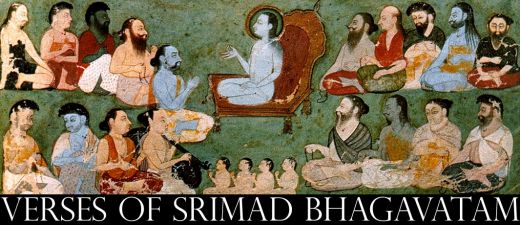In the Srimad Bhagavatam’s third canto, chapter twenty-nine, Kapila (an avatar of Krishna) instructs his mother Devahuti regarding how a bhakti-yogi pleases the Lord, not through empty ritual, but through recognition of the Lord everywhere, and through behavior illumined by such vision. In this translation Sri Bhaktivedanta Swami uses the term “Supersoul” (usually used as a literal translation for Paramatma) for the Sanskrit bhuta-atma and atmanam, referring to the four-armed form of Lord Vishnu residing in the hearts of all beings, who acts as the overseer and the enabler of their actions as well as the friend who reminds them of how to act towards their own advancement. Here, perception of God in all, and the ensuing gracious behavior, become the goal in yoga practice and the ingredient in ritual which pleases God. Discrimination between oneself and others, even for one who externally shows respect for God, results in the absence of manah shantim (a peaceful mind) and brings about fear of death.
SRIMAD BHAGAVATAM
3.29.20
yatha vata-ratho ghranam
avrinkte gandha asayat
evam yoga-ratam ceta
atmanam avikari yat
As the chariot of air carries an aroma from its source and immediately catches the sense of smell, similarly, one who constantly engages in devotional service, in Krishna consciousness, can catch the Supreme Soul, who is equally present everywhere.
3.29.22
aham sarveshu bhuteshu
bhutatmavasthitah sada
tam avajnaya mam martyah
kurute ‘rca-vidambanam
I am present in every living entity as the Supersoul. If someone neglects or disregards that Supersoul everywhere and engages himself in the worship of the Deity in the temple, that is simply imitation.
3.29.22
yo mam sarveshu bhuteshu
santam atmanam isvaram
hitvarcam bhajate maudhyad
bhasmany eva juhoti sah
One who worships the Deity of Godhead in the temples but does not know that the Supreme Lord, as Paramatma, is situated in every living entity’s heart, must be in ignorance and is compared to one who offers oblations into ashes.
3.29.23
dvishatah para-kaye mam
manino bhinna-darsinah
bhuteshu baddha-vairasya
na manah santim ricchati
One who offers Me respect but is envious of the bodies of others and is therefore a separatist never attains peace of mind, because of his inimical behavior towards other living entities.
3.29.24
aham uccavacair dravyaih
kriyayotpannayanaghe
naiva tushye ‘rcito ‘rcayam
bhuta-gramavamaninah
My dear Mother, even if he worships with proper rituals and paraphernalia, a person who is ignorant of My presence in all living entities never pleases Me by the worship of My Deities in the temple.
3.29.25
arcadav arcayet tavad
isvaram mam sva-karma-krit
yavan na veda sva-hridi
sarva-bhuteshv avasthitam
Performing his prescribed duties, one should worship the Deity of the Supreme Personality of Godhead until one realizes My presence in his own heart and in the hearts of other living entities as well.
3.29.26
atmanas ca parasyapi
yah karoty antarodaram
tasya bhinna-driso mrityur
vidadhe bhayam ulbanam
As the blazing fire of death, I cause great fear to whoever makes the least discrimination between himself and other living entities because of a differential outlook.
3.29.27
atha mam sarva-bhuteshu
bhutatmanam kritalayam
arhayed dana-manabhyam
maitryabhinnena cakshusha
Therefore, through charitable gifts and attention, as well as through friendly behavior and by viewing all to be alike, one should propitiate Me, who abide in all creatures as their very Self.
Translation by Srila A.C. Bhaktivedanta Swami Prabhupada, courtesy of The Bhaktivedanta Book Trust International, Inc. Used with permission.
(The Srimad Bhagavatam (Bhagavat Purana, or simply the Bhagavatam) holds a prominent position in India’s voluminous spiritual literature. Consisting of about 18,000 Sanskrit verses, it blends profound theological insight and social and ethical reflection with exquisite poetry to develop its evolved doctrine of bhakti. The Bhagavatam takes the form of a collection of stories narrated by the rishi Sukadeva to King Parikshit, the grandson of Arjuna. Regarding its influence, Professor Edwin F. Bryant notes that the Bhagavatam “has inspired more derivative literature, poetry, drama, dance, theater and art than any other text in the history of Sanskrit literature, with the possible exception of the Ramayana.”)
Related Posts: On Santosha and Satisfying Uncontrolled Senses / A Madman’s Discourse on the Workings of the Mind / The Ornaments of a Sadhu
